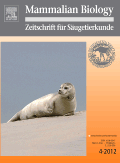
MAMMALIAN BIOLOGY
Scope & Guideline
Advancing the Frontiers of Mammalian Science
Introduction
Aims and Scopes
- Ecological and Behavioral Studies:
Research focusing on the ecological interactions of mammals, their behavior in different environments, and how these factors influence their survival and reproduction. - Genetic and Genomic Research:
Studies that explore the genetic diversity, population structure, and evolutionary history of mammals using molecular techniques such as DNA sequencing and phylogenetic analysis. - Conservation and Management Practices:
Research aimed at assessing the conservation status of mammalian species, their habitats, and the effectiveness of management practices to mitigate threats such as habitat loss and climate change. - Morphological and Physiological Investigations:
Investigations into the physical traits and physiological adaptations of mammals, including studies on body condition, size dimorphism, and the impact of environmental factors on their morphology. - Human-Wildlife Interactions:
Studies examining the impacts of human activities on mammalian species, including urbanization effects, human-wildlife conflict, and the role of mammals in ecosystems.
Trending and Emerging
- Molecular Ecology and Conservation Genetics:
An increase in studies utilizing molecular techniques to explore genetic diversity and conservation strategies, reflecting a trend toward using genetic data to inform conservation efforts and understand population dynamics. - Human-Induced Environmental Changes:
A rising number of publications focusing on the impacts of human activities, such as urbanization and climate change, on mammal populations and ecosystems, highlighting the need for adaptive management strategies. - Innovative Monitoring Techniques:
The adoption of advanced technologies, such as camera traps and acoustic monitoring, for studying mammalian populations and behaviors is becoming prevalent, enhancing data collection and analysis in field studies. - Interdisciplinary Approaches to Conservation:
Emerging themes that integrate social science perspectives with biological research to address conservation challenges, emphasizing the importance of human dimensions in wildlife management. - Adaptation to Anthropogenic Environments:
Increased focus on how mammals adapt to urban and modified landscapes, including studies on behavioral plasticity and ecological resilience, reflecting a shift towards understanding species survival in changing environments.
Declining or Waning
- Traditional Taxonomic Studies:
There has been a noticeable decrease in papers focusing solely on taxonomic classifications without integrating ecological or genetic data. This shift may be due to the increasing emphasis on understanding ecological roles and evolutionary relationships. - Isolated Habitat Studies:
Research concentrating on isolated or specific habitats without broader ecological context appears to be declining, as the journal's focus moves toward studies that incorporate landscape-level analyses and broader ecological implications. - Descriptive Behavioral Studies:
There is a reduction in purely observational studies documenting mammalian behaviors without experimental or comparative frameworks, as the journal increasingly values studies that contribute to understanding the underlying mechanisms.
Similar Journals

Avian Biology Research
Championing conservation through innovative research.Avian Biology Research, published by SAGE PUBLICATIONS LTD, is a leading journal dedicated to advancing the study of avian species through high-quality, peer-reviewed research. With an ISSN of 1758-1559 and an E-ISSN of 1758-1567, this journal has established itself as a vital resource within the fields of Animal Science and Zoology, as well as Ecology, Evolution, Behavior, and Systematics. The journal is currently ranked Q3 in both categories according to the 2023 release of the category quartiles, and it contributes significantly to the global understanding of avian biology, including behavior, physiology, and conservation efforts. Positioned within the competitive landscape of the Scopus rankings, it finds itself amidst a diverse array of research, with medical and environmental implications. As an open-access journal, Avian Biology Research ensures greater accessibility to its contents, fostering disseminative opportunities for researchers, professionals, and students alike. With a publication window spanning from 2008 to 2024, it continues to be an invaluable platform for the dissemination and dialogue of avian research, thereby enlightening future inquiries and driving scientific advancements in this crucial area of biology.

RUSSIAN JOURNAL OF THERIOLOGY
Advancing the Frontiers of Terrestrial EcosystemsRUSSIAN JOURNAL OF THERIOLOGY is a prominent academic journal published by KMK SCIENTIFIC PRESS LTD in collaboration with the esteemed Moscow State University. As a dedicated platform for researchers in the fields of Animal Science and Zoology, Ecology, Evolution, Behavior and Systematics, and Plant Science, this journal strives to advance our understanding of terrestrial ecosystems and their inhabitants. Although it currently holds a Q4 ranking and ranks within the lower percentiles of its respective categories, the journal's consistent publishing output since 2011 showcases a commitment to facilitating scientific discourse and collaboration. Addressed to a diverse audience of researchers, professionals, and students, RUSSIAN JOURNAL OF THERIOLOGY serves as an essential resource for disseminating valuable insights and fostering future advancements in the biological sciences.

Evolutionary Biology
Bridging Disciplines in the Study of Life's DiversityEvolutionary Biology is a distinguished academic journal published by Springer, focusing on the intricate fields of ecology, evolution, behavior, and systematics. This journal, with the ISSN 0071-3260 and E-ISSN 1934-2845, has established itself as a critical platform for cutting-edge research and innovative ideas that shape our understanding of biological evolution and its implications. Operating from Germany, it ranks in the Q2 quartile in its category for 2023, placing it in the top tier of journals recognized for quality and impact, with a Scopus rank in the 66th percentile among its peers. Despite not being Open Access, this journal ensures comprehensive dissemination of knowledge essential for researchers, professionals, and students passionate about evolutionary studies. With a publication history tracing back to 1993 and converging years up to 2024, Evolutionary Biology continues to significantly impact the academic landscape, fostering dialogue and collaboration across various disciplines within the biological sciences.
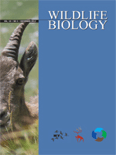
WILDLIFE BIOLOGY
Exploring the intricate connections of nature's diversity.WILDLIFE BIOLOGY is a prestigious open-access journal published by WILEY, dedicated to the dissemination of high-quality research in the fields of ecology, evolution, behavior, and conservation. With an impressive Impact Factor indicative of its scholarly relevance, the journal has been a cornerstone for researchers since its inception in 1995, now extending its convergence through 2024. Recognized within the top Q1 and Q2 quartiles across various categories—including Ecology, Evolution, Behavior and Systematics and Management, Monitoring, Policy and Law—this journal plays a crucial role in fostering knowledge and promoting effective solutions in wildlife biology. The journal serves a diverse audience, offering robust access options since 2014, ensuring that vital research is freely available to professionals, researchers, and students alike. With its base in Denmark, the journal encourages contributions that address pressing wildlife management issues and informs policy development, further cementing its significance in the ecological research community.
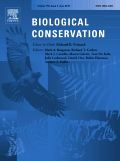
BIOLOGICAL CONSERVATION
Elevating Conservation Efforts with High-Impact Findings.BIOLOGICAL CONSERVATION, published by Elsevier Science Ltd, is a leading international journal dedicated to advancing the science and practice of biological conservation. Since its inception in 1968, the journal has provided a critical platform for researchers, professionals, and students in the fields of Ecology, Evolution, Behavior, and Systematics as well as Nature and Landscape Conservation. With an impressive impact factor, and ranked in the Q1 category within both ecological and conservation domains in 2023, it emphasizes high-quality empirical and theoretical research essential for understanding and addressing pressing environmental challenges. Although it follows a subscription model, the journal is known for its rigorous peer-reviewed articles that contribute significantly to the field, ensuring that the latest findings and methodologies are readily accessible to practitioners. As a vital resource for those engaged in conservation efforts globally, BIOLOGICAL CONSERVATION stands out for its commitment to enhancing knowledge and informing strategies that safeguard biodiversity across ecosystems.
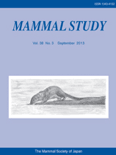
MAMMAL STUDY
Exploring the diverse world of mammals and their ecosystems.Mammal Study, published by the Mammalogical Society of Japan, is a leading academic journal dedicated to the field of mammalogy and related biological sciences. Since its inception, it has provided a critical platform for researchers, professionals, and students to share their findings and insights into the diverse facets of mammalian biology, ecology, and conservation. The journal, with ISSN 1343-4152 and E-ISSN 1348-6160, is recognized for its rigorous peer-review process and has attained a commendable Q3 ranking in the 2023 category of Animal Science and Zoology. With an impact factor reflecting its growing influence—ranking 283 out of 490 in Scopus—we welcome contributions that advance the understanding of mammalian species and their habitats. While access to published articles is through traditional channels, the journal aims to reach an even wider audience by fostering greater awareness and appreciation for mammalian research and conservation efforts. The Mammal Study has converged years of insightful publications from 2008 to 2024, solidifying its position as a vital resource in the biological sciences.
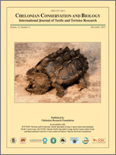
CHELONIAN CONSERVATION AND BIOLOGY
Championing the science of turtle and tortoise preservation.Chelonian Conservation and Biology is a distinguished academic journal dedicated to advancing the field of chelonian research, encompassing conservation, ecology, and biology of turtles and tortoises. Published by Allen Press Inc in the United States, this journal is well-regarded within the realm of Animal Science and Zoology, as well as Ecology, Evolution, Behavior and Systematics, holding a commendable Q3 ranking in both categories for 2023. With an ISSN of 1071-8443 and an E-ISSN of 1943-3956, the journal features a diverse range of articles aimed at professionals, researchers, and students, fostering an understanding of the critical challenges facing chelonians worldwide. Although not an open-access publication, Chelonian Conservation and Biology provides high-quality content, including original research, reviews, and case studies, encouraging engagement and collaboration among experts. With coverage extending from 2006 to 2024, the journal serves as a vital platform for disseminating knowledge and promoting conservation efforts essential to the survival of these remarkable species.

Conservation Genetics Resources
Championing Genetic Diversity in Conservation EffortsConservation Genetics Resources, published by SPRINGER in Germany, is a key resource in the field of conservation science, focusing on the genetic aspects essential for biodiversity preservation and ecosystem management. With an ISSN of 1877-7252 and an E-ISSN of 1877-7260, this journal has established its presence as a vital platform for disseminating high-quality research that addresses the challenges of genetic conservation strategies. Notably, it has demonstrated a strong academic impact, currently holding a Q3 ranking in Ecology, Evolution, Behavior and Systematics and Q4 in Genetics for 2023, alongside Scopus ranks that position it as a notable contributor in its fields. This journal invites contributions that enhance the understanding of genetic diversity, population genetics, and conservation genomics, and it serves as an essential reference for researchers, professionals, and students committed to the preservation of our natural heritage. The access options are varied, catering to the needs of its diverse readership, and making it an indispensable addition to academic research spaces.
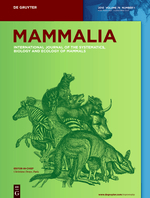
MAMMALIA
Unlocking the mysteries of the mammalian world.MAMMALIA, published by Walter de Gruyter GmbH, is a renowned academic journal founded in 1936 that serves as a pivotal resource for researchers and professionals in the fields of Animal Science and Zoology as well as Ecology, Evolution, Behavior and Systematics. With an ISSN of 0025-1461 and an E-ISSN of 1864-1547, this journal has made significant contributions to mammalian research over the decades and continues to be pivotal in advancing knowledge within the scientific community. MAMMALIA is indexed in prominent databases, boasting a current Scopus ranking that places it within the upper echelons of the Q2 category in Animal Science and Zoology, and Q3 in Ecology, Evolution, Behavior and Systematics. Although it does not offer open access, the journal remains accessible through various academic institutions, ensuring that valuable research findings are disseminated widely. The journal’s commitment to quality and excellence in the study of mammals aligns with its high impact within the field, engaging a diverse readership that includes researchers, students, and professionals dedicated to furthering the understanding of mammalian biology. For more information, visit their office located at Genthiner Strasse 13, D-10785 Berlin, Germany.

Botanical Sciences
Unlocking the secrets of plant life for a thriving planet.Botanical Sciences, published by SOC BOTANICA MEXICO, is a pioneering open access journal dedicated to advancing the field of plant science. Established in 2012, it has rapidly become an essential resource for researchers and professionals interested in the diverse aspects of botany, including plant biology, ecology, and conservation. With an ISSN of 2007-4298 and an E-ISSN of 2007-4476, the journal operates under a vision to foster the exchange of knowledge and innovations among scientists globally. Recognized in the Q3 quartile for plant science in 2023 and ranking at #304 out of 516 in the Scopus category for Agricultural and Biological Sciences, Botanical Sciences is strategically positioned to widen its reach and impact. The journal's commitment to open access ensures that research findings are freely available to an international audience, providing invaluable insights and fostering collaboration within the botanical sciences community. The editorial board comprises leading experts who are dedicated to maintaining high-quality peer review processes to uphold the standards expected by the academic community.